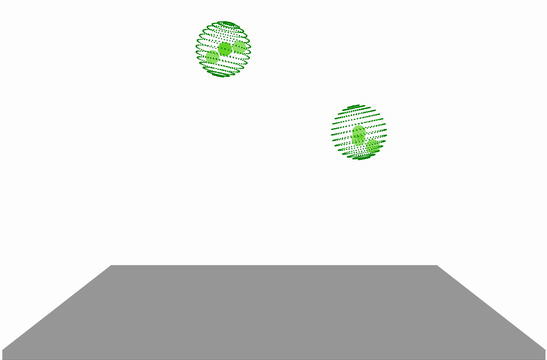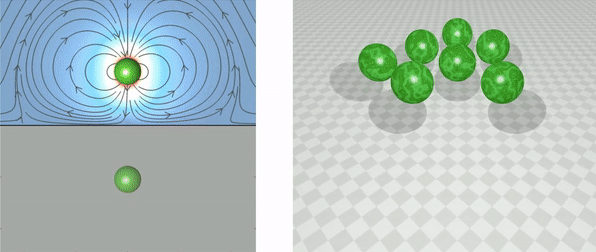About | Installation | Documentation | Examples | Publications | Gallery | Support | License
PyStokes is a numerical library for phoresis and Stokesian hydrodynamics in Python. It uses a grid-free method, combining the integral representation of Laplace and Stokes equations, spectral expansion, and Galerkin discretization, to compute phoretic and hydrodynamic interactions between spheres with slip boundary conditions on their surfaces. The library also computes suspension scale quantities, such as rheological response, energy dissipation and fluid flow. The computational cost is quadratic in the number of particles and upto 1e5 particles have been accommodated on multicore computers. The library has been used to model suspensions of microorganisms, synthetic autophoretic particles and self-propelling droplets.
You can take PyStokes for a spin online using Google Colab:
Please read the PyStokes paper and Wiki before you use PyStokes for your research. Included below are some examples from PyStokes Gallery:
Our work shows that the oscillatory dynamics of a pair of active particles near
a boundary, best exemplified by the fascinating dance of the green algae
Volvox, can be understood in terms of Hamiltonian mechanics, even though the
system does not conserve energy. Read more in the PyStokes Gallery.
It is well-known that crystallization of colloids approximating hard spheres is due, paradoxically, to the higher entropy of the ordered crystalline state compared to that of the disordered liquid state. Out of equilibrium, no such general principle is available to rationalize crystallization. In this work, we identify a new non-equilibrium mechanism, associated with entropy production rather than entropy gain, which drives crystallization of active colloids near plane walls. Read more in the PyStokes Gallery.
26th July 2019 -- PyStokes can compute hydrodynamic and phoretic interactions in autophoretic suspensions.
>> git clone https://github.com/rajeshrinet/pystokes.git
>> cd pystokes
>> pip install -r requirements.txt
>> python setup.py installInstall the latest PyPI version
>> pip install pystokesTest installation and running
>> cd tests
>> python test_short.pyLong test of example notebooks
>> cd tests
>> python test_notebooks.py# Example 1: Flow field due to $2s$ mode of active slip
import pystokes, numpy as np, matplotlib.pyplot as plt
# particle radius, self-propulsion speed, number and fluid viscosity
b, eta, N = 1.0, 1.0/6.0, 1
# initialize
r, p = np.array([0.0, 0.0, 3.4]), np.array([0.0, 1.0, 0])
V2s = pystokes.utils.irreducibleTensors(2, p)
# space dimension , extent , discretization
dim, L, Ng = 3, 10, 64;
# instantiate the Flow class
flow = pystokes.wallBounded.Flow(radius=b, particles=N, viscosity=eta, gridpoints=Ng*Ng)
# create grid, evaluate flow and plot
rr, vv = pystokes.utils.gridYZ(dim, L, Ng)
flow.flowField2s(vv, rr, r, V2s)
pystokes.utils.plotStreamlinesYZsurf(vv, rr, r, offset=6-1, density=1.4, title='2s')#Example 2: Phoretic field due to active surface flux of l=0 mode
import pystokes, numpy as np, matplotlib.pyplot as plt
# particle radius, fluid viscosity, and number of particles
b, eta, N = 1.0, 1.0/6.0, 1
#initialise
r, p = np.array([0.0, 0.0, 5]), np.array([0.0, 0.0, 1])
J0 = np.ones(N) # strength of chemical monopolar flux
# space dimension , extent , discretization
dim, L, Ng = 3, 10, 64;
# instantiate the Flow class
phoreticField = pystokes.phoretic.unbounded.Field(radius=b, particles=N, phoreticConstant=eta, gridpoints=Ng*Ng)
# create grid, evaluate phoretic field and plot
rr, vv = pystokes.utils.gridYZ(dim, L, Ng)
phoreticField.phoreticField0(vv, rr, r, J0)
pystokes.utils.plotContoursYZ(vv, rr, r, density=.8, offset=1e-16, title='l=0') Other examples include
- Irreducible Active flows
- Effect of plane boundaries on active flows
- Active Brownian Hydrodynamics near a plane wall
- Flow-induced phase separation at a plane surface
- Irreducible autophoretic fields
- Autophoretic arrest of flow-induced phase separation
A selected list of publications is given below. See full publication list here.
-
PyStokes: phoresis and Stokesian hydrodynamics in Python, R Singh and R Adhikari, Journal of Open Source Software, 5(50), 2318, (2020). (Please cite this paper if you use PyStokes in your research).
-
Controlled optofluidic crystallization of colloids tethered at interfaces, A Caciagli, R Singh, D Joshi, R Adhikari, and E Eiser, Physical Review Letters 125 (6), 068001 (2020)
-
Periodic Orbits of Active Particles Induced by Hydrodynamic Monopoles, A Bolitho, R Singh, R Adhikari, Physical Review Letters 124 (8), 088003 (2020)
-
Competing phoretic and hydrodynamic interactions in autophoretic colloidal suspensions, R Singh, R Adhikari, and ME Cates, The Journal of Chemical Physics 151, 044901 (2019)
-
Generalized Stokes laws for active colloids and their applications, R Singh and R Adhikari, Journal of Physics Communications, 2, 025025 (2018)
-
Flow-induced phase separation of active particles is controlled by boundary conditions, S Thutupalli, D Geyer, R Singh, R Adhikari, and HA Stone, Proceedings of the National Academy of Sciences, 115, 5403 (2018)
-
Universal hydrodynamic mechanisms for crystallization in active colloidal suspensions, R Singh and R Adhikari, Physical Review Letters, 117, 228002 (2016)
- For help with and questions about PyStokes, please post to the pystokes-users group.
- For bug reports and feature requests, please use the issue tracker on GitHub.
We believe that openness and sharing improves the practice of science and increases the reach of its benefits. This code is released under the MIT license. Our choice is guided by the excellent article on Licensing for the scientist-programmer.






